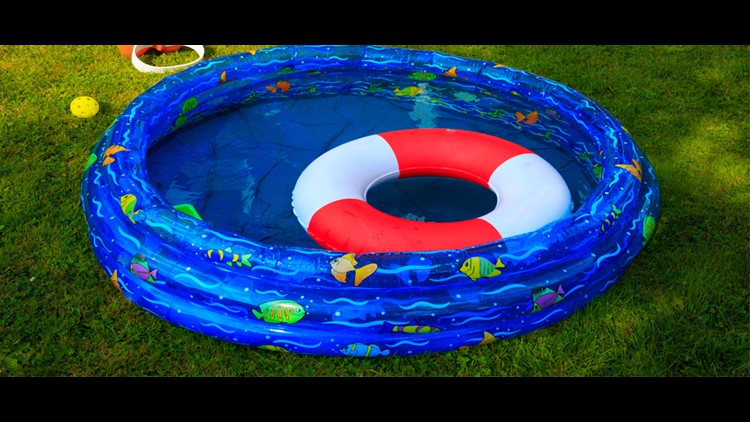HENDRICKS COUNTY, Ind. (WTHR) – The Hendricks County Health Department is issuing several warnings as we get into the warmer season.
With people spending more time outdoors and on the water, the health department wants to remind people of water safety and the precautions to take for flea and tick prevention.
Over the weekend, conservation officers also stressed the importance of water safety after three different water recovery efforts by conservation officers within four days.
According to the HCHD, three common water risks include recreational water illness, injuries due to imbalanced or improper handling of pool chemicals, and injuries or drowning.
“The best ways to prevent RWIs are to avoid swallowing pool or hot-tub water, to shower yourself and your kids before swimming, to avoid swimming if you or your kids have had diarrhea in the past 2 weeks, to take your kids on restroom breaks before and regularly when swimming, and to check or change diapers in a restroom rather than poolside,” says Krista Click, Environmental Health Director for the HCHD.
Imbalanced chemicals can also cause serious injury to swimmers in pools, hot-tubs and water play areas. The CDC says that between 3,000 and 5,000 emergency department visits occur every year due to recreational water chemical injuries such as burns, ingestion and respiratory issues.
Drowning is also the second leading cause of death in children ages 1 to 4 in the U.S., according to the CDC.
“Every day, about ten people die from unintentional drowning. Of these, two will be children aged 14 or younger," the CDC says.
Chase Cotten, Public Health Education Specialist for the HCHD, gave this list of precautions:
- Do not leave your child alone in or near water.
- Ensure pools have compliant drain covers.
- Ensure pools have installed barriers around and/or covers on pools.
- Take the time to teach you kids how to swim.
- Learn how to perform CPR, just in case.
For more information on recreational water safety, visit the CDC's Healthy Swimming webpage or the Indiana State Department of Health’s Recreational Water webpage.
The HCHD is also urging people to be aware of how to prevent the spread of diseases carried by mosquitoes.
“Basically, anywhere that water can pool is an ideal breeding ground for mosquitoes,” reports Krista Click, Environment Health Director for the HCHD. “For example: clogged rain gutters, flower pots, plant saucers, puddles, buckets, garden equipment, trash cans, old tires, bird baths, plastic sheeting – each of these common items can collect still water where mosquitoes lay their eggs.”
The HCHD has issued a list of the 10 best ways to prevent mosquito-borne illness:
- Repair failed septic systems.
- Dispose of old tires, cans, plastic containers, ceramic pots, and other containers that can hold water. The Hendricks County Solid Waste Management District also collects old tires at seasonal “Tox-Away Days.”
- Drill holes in the bottom of recycling containers that are left out of doors.
- Clean clogged roof gutters.
- Keep swimming pool covers free of standing water.
- Aerate ornamental pools or stock them with fish.
- Keep birdbaths clean and regularly empty any water from various containers which you plan to keep.
- Stay indoors between dusk and dawn when mosquitoes are most active, or use a mosquito net if staying or sleeping outside in an unscreened structure.
- Use an insect repellant containing DEET, picaridin, oil of lemon eucalyptus, PMD, or IR3535 as directed.
- When outside, cover as much skin as possible with light colored, tightly woven clothes. Also wear shoes, socks, long pants and long-sleeved shirts, and tuck pant legs into shoes or socks. Pre-treated, insect repellant clothing is also available for purchase and use.
Common symptoms of mosquito-borne illness may include fever, headache, nausea, vomiting and rash. More serious cases may include stiffness, swelling and various neurological effects like tremors, seizures or coma depending on the virus.
Tick season has also begun and most recent data from the CDC reports that the most common types of ticks found in Hendricks County are American Dog Ticks, Brown Dog Ticks, Blacklegged Ticks, and Lone Star Ticks.
According to the Indiana State Department of Health, adult ticks generally prefer, “grassy, bushy, or woody areas,” where they can come in contact with a mammal (human, deer, dog, etc.).
Keeping your yard well-trimmed, avoiding contact with trees and brush, treating your pets with tick-killing preventatives, and washing/drying your clothes in high heat after being outdoors is highly recommended by the CDC.
For more information about tick prevention, visit the CDC’s Ticks webpage.



